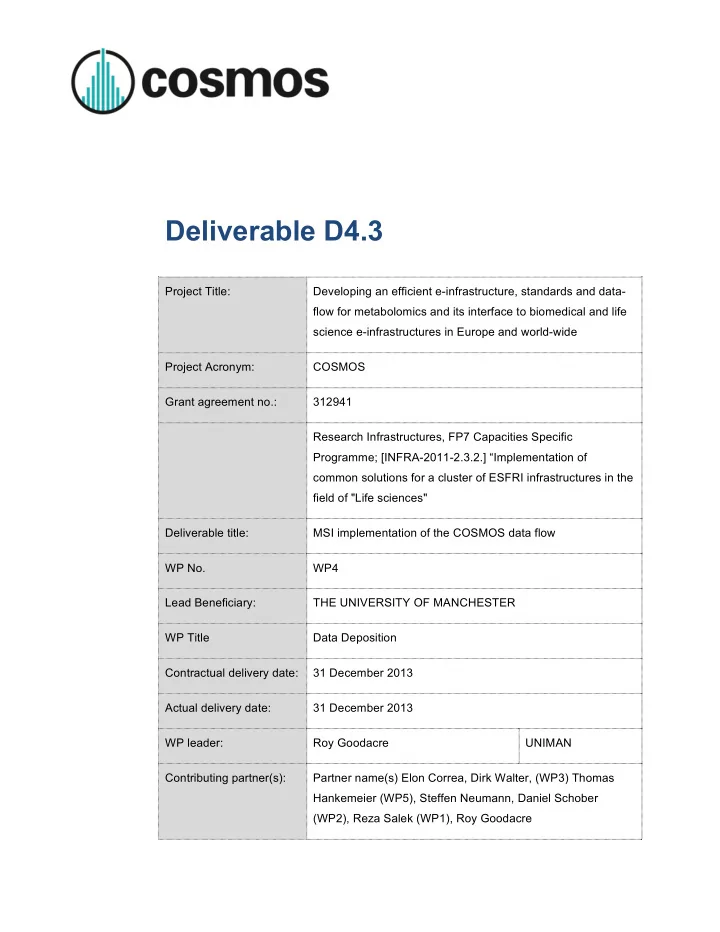

Deliverable D4.3 Project Title: Developing an efficient e-infrastructure, standards and data- flow for metabolomics and its interface to biomedical and life science e-infrastructures in Europe and world-wide Project Acronym: COSMOS Grant agreement no.: 312941 Research Infrastructures, FP7 Capacities Specific Programme; [INFRA-2011-2.3.2.] “Implementation of common solutions for a cluster of ESFRI infrastructures in the field of "Life sciences" Deliverable title: MSI implementation of the COSMOS data flow WP No. WP4 Lead Beneficiary: THE UNIVERSITY OF MANCHESTER WP Title Data Deposition Contractual delivery date: 31 December 2013 Actual delivery date: 31 December 2013 WP leader: Roy Goodacre UNIMAN Contributing partner(s): Partner name(s) Elon Correa, Dirk Walter, (WP3) Thomas Hankemeier (WP5), Steffen Neumann, Daniel Schober (WP2), Reza Salek (WP1), Roy Goodacre
2 | 16 Authors: Elon Correa, Reza Salek, Roy Goodacre Contents 1 ¡ ....................................................................................................... 3 ¡ Executive summary 2 ¡ Project objectives .......................................................................................................... 3 ¡ 3 ¡ Detailed report on the deliverable ................................................................................. 3 ¡ 3.1 ¡ Background ............................................................................................................ 3 ¡ 3.2 ¡ Description of Work ................................................................................................ 4 ¡ 3.3 ¡ ............................................................................................................. 11 ¡ Next steps 4 ¡ ................................................................................................................. 11 ¡ Publications 5 ¡ ................................................................................................. 11 ¡ Delivery and schedule 6 ¡ Adjustments made ...................................................................................................... 11 ¡ 7 ¡ ............................................................................................ 12 ¡ Efforts for this deliverable 8 ¡ ................................................................................................................. 12 ¡ References ..................................................................................................... 14 ¡ Background information ¡ COSMOS Deliverable D4.3
3 | 16 1 Executive summary This deliverable aims to describe actions taken towards the effective implementation of Metabolomics Standards Initiative (MSI) (Fiehn et al. 2007) standards to the COSMOS data flow. To achieve this common schema, a number of community agreed standards, or attributes, are being extracted from MSI and carefully discussed and evaluated by all COSMOS members. The objective is to deliver a COSMOS data flow which communicates data efficiently and effectively and is as MSI compliant as possible . 2 Project objectives With this deliverable, the project has reached or the deliverable has contributed to the following objectives: No. Objective Yes No 1 MSI implementation of the COSMOS data flow X 3 Detailed report on the deliverable 3.1 Background Well documented datasets freely available and shared with the scientific community for secondary data usage will add value to existing knowledge and accelerate advances in metabolomics. To drive these changes, the development and implementation of an efficient e-infrastructure is a necessity. Such platform will harmonize the data-flow using clearly defined communication protocols, data exchange standards and minimum information (MI) reporting. In 2005 the COSMOS Deliverable D4.3
4 | 16 Metabolomics Standards Initiative (MSI) (Fiehn et a l. 2007, Sansone et al . 2007) was conceived following earlier work by the Standard Metabolic Reporting Structure (SMRS) initiative and the Architecture for Metabolomics (ArMet) consortium. The early efforts of MSI were focused on community-agreed reporting standards, which defined the minimum information required for the clear description of the biological system studied and all components of metabolomics studies. These MI standards are currently collected under the biosharing umbrella (http://www.biosharing.org/standards/mibbi). Collectively, the MSI workgroups (WG) are working towards developing the following Core Information for Metabolomics Reporting . This document will specify the minimal guidelines reporting metabolomics work. It will do so in a textual form and will seek in the long term to cover all application areas and analysis technologies. This document will be developed by the biological context metadata working group (WG), the chemical analysis WG, the data processing WG, the exchange format WG and the ontology WG. 3.2 Description of Work The true relevance of MSI for data sharing and experimental protocols in metabolomics was recently summarized in an editorial (Goodacre 2014) which listed all community-agreed MI papers relevant in the metabolomics domain. Figure 1, extracted from the editorial, connects each of those MI standards to the topic domain at which they are aimed. COSMOS Deliverable D4.3
5 | 16 Figure 1: Overview of the metabolomics data pipeline showing where existing MSI minimal reporting guidelines (highlighted in blue) are aimed. Some of these MI standards have also been solicited by major journals to enforce policies as part of publishing best practices . The Sumner et al. (2007) reporting standard on metabolite identification levels for example was made a prerequisite to submit to the Metabolomics journal, which now requires its authors to follow these guidelines explicitly, and tables with lists of metabolites must now contain reference to which of the four community agreed levels of metabolite identification have been made (these are provided in Table 1). COSMOS Deliverable D4.3
6 | 16 Table 1: A summary of the four-metabolite identification levels as defined by MSI (Sumner et al. 2007). 1 Identified compounds This definitive identification level requires a minimum of at least two independent and orthogonal data relative to an authentic compound analysed under identical experimental conditions in the same laboratory on the same analytical platform These orthogonal data must provide different physicochemical properties of the metabolite and for examples may be: retention time/ index and mass spectrum; retention time and 1H/13C NMR spectrum 2 Putatively annotated compounds These are very similar to level 1 BUT are identifications that are made without chemical reference standards. The above orthogonal characteristics are still used but are typically matched against public or commercially available spectral libraries 3 Putatively characterized compound classes This level defines compounds that are based upon characteristic physicochemical properties of a chemical class of compounds, or by spectral similarity to known compounds of a chemical class For example, a fatty acid like C18:1 fatty acid where the unsaturation point is not known (for oleic acid–(9Z)-octadec-9-enoic acid– this would become C18:1 cis-9 if matched with a standard). Another example is a C6 sugar 4 Unknown compounds Whilst these are unidentified or unclassified compounds, these small molecules can still be differentiated, recognized again by the analyst in further analysis, and therefore quantified based upon spectral data COSMOS Deliverable D4.3
Recommend
More recommend